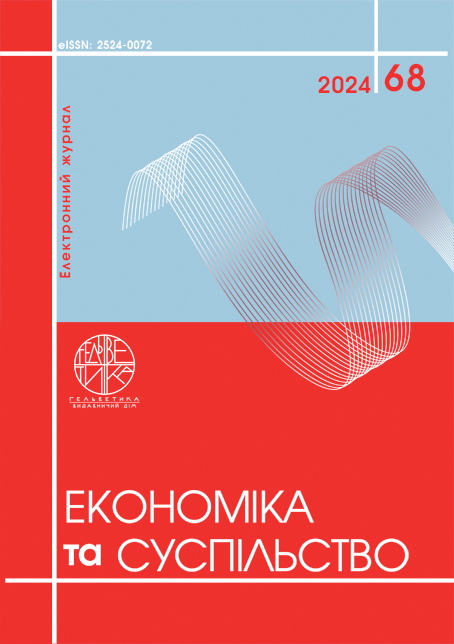DIGITAL-МАРКЕТИНГ НА ЄВРОПЕЙСЬКОМУ РИНКУ: ВИКЛИКИ ВНАСЛІДОК ВІЙНИ В УКРАЇНІ
Abstract
The purpose of the article is to characterize the features of Digital marketing in the European market. Europe has been proven to be home to some of the world's advanced economies where consumers are eager to embrace digital technology. It has been established that digital marketing in the European market is characterized by its sophisticated integration of technology, analytics and cultural diversity, targeting a wide range of consumers from different countries. The key features of modern digital marketing in the European market are highlighted. The most significant advantages of digital marketing in wartime conditions have been identified. Digital marketing has been proven to have transformational potential for the European market, particularly due to its ability to target consumers across a diverse and expansive region. The digitalization trend is not temporary, but rather indicates a permanent change in the way consumers interact with brands. Companies that leverage the power of digital marketing can engage with customers in real time, personalize their marketing messages, and track the performance of their campaigns with precision, optimizing their marketing strategies and improving marketing investments. In addition, increasing competition in the European market is forcing companies to adopt digital marketing strategies. As more companies go digital, the market environment is becoming highly competitive. Digital marketing provides the tools for companies to stand out, more accurately target their audience, and create engagement through innovative and interactive content. Continuous innovations in digital marketing technologies, such as artificial intelligence, are also improving the efficiency and effectiveness of marketing campaigns, making digital marketing not just relevant but essential for success in today’s European market. Digital marketing in Europe places a heavy emphasis on compliance with data protection laws, ensuring that all marketing practices meet strict privacy standards, which in turn influences the tools and strategies that marketers can use.
References
Juščius, V., Navickas, V., & Jonikas, D. Relationship marketing: theorethical aspects. Business: Theory and Practice, 7(4), 2006, 254-262. https://doi.org/10.3846/btp.2006.31
Dabrowski, D., Brzozowska-Woś, M., Gołąb-Andrzejak, E., & Firgolska, A. Market orientation and hotel performance: The mediating effect of creative marketing programs. Journal of Hospitality and Tourism Management, 41, 2019, 175–183. https://doi.org/10.1016/j.jhtm.2019.10.006
Karnowati, N., & Handayani, E. Mediation role of business performance on entrepreneurship orientation and market orientation to create MSME competitiveness in pandemic times. International Journal of Research in Business and Social Science (2147–4478), 11(6), 2022, 138–147. https://doi.org/10.20525/ijrbs.v11i6.1980
lgarhy, S. D., & Abou-Shouk, M. Effects of entrepreneurial orientation, marketing, and innovation capabilities, on market performance: The mediating effect of sustainable competitive advantage. International Journal of Contemporary Hospitality Management, 35(6), 2023, 1986–2004. https://doi.org/10.1108/IJCHM-04-2022-0508
Achmad, W. MSMEs empowerment through digital innovation: The key to success of e-commerce in Indonesia. Daengku: Journal of Humanities and Social Sciences Innovation, 3(3), 2023, 469–475. https://doi.org/10.35877/454RI.daengku1742
Dahmiri, D., Junaidi, J., Johannes, J., Yacob, S., & Indrawijaya, S. The impact of market orientation on marketing performance: exploring the moderating role of competitive advantage. Business: Theory and Practice, 25(1), 2024, 164–174. https://doi.org/10.3846/btp.2024.20174
Kaleka, A., & Morgan, N. A. Which competitive advantage(s)? Competitive advantage-market performance relationships in international markets. Journal of International Marketing, 25(4), 2017, 25–49. https://doi.org/10.1509/jim.16.0058
Harjadi, D., Fatmasari, D., & Nurhasanah, A. S. Market orientation and product innovation to increase competitive advantages and its impact on marketing performance. Al-Amwal: Jurnal Ekonomi Dan Perbankan Syari’ah, 12(1), 2020, 12–21. https://doi.org/10.24235/amwal.v1i1.5457
Chin, C. H., Lo, M. C., & Ramayah, T. Market orientation and organisational performance: The moderating role of service quality. Sage Open, 2013, 3(4). https://doi.org/10.1177/2158244013512664
Bivainis, J., & Daukševičiūtė, I. An optimisation model for the marketing programmes of companies. Business: Theory and Practice, 14(3), 2013, 228-239. https://doi.org/10.3846/btp.2013.24
Juščius, V., Navickas, V., & Jonikas, D. (2006). Relationship marketing: theorethical aspects. Business: Theory and Practice, 7(4), 254-262. https://doi.org/10.3846/btp.2006.31 [In English]
Dabrowski, D., Brzozowska-Woś, M., Gołąb-Andrzejak, E., & Firgolska, A. (2019). Market orientation and hotel performance: The mediating effect of creative marketing programs. Journal of Hospitality and Tourism Management, 41, 175–183. https://doi.org/10.1016/j.jhtm.2019.10.006 [In English]
Karnowati, N., & Handayani, E. (2022). Mediation role of business performance on entrepreneurship orientation and market orientation to create MSME competitiveness in pandemic times. International Journal of Research in Business and Social Science (2147–4478), 11(6), 138–147. https://doi.org/10.20525/ijrbs.v11i6.1980 [In English]
lgarhy, S. D., & Abou-Shouk, M. (2023). Effects of entrepreneurial orientation, marketing, and innovation capabilities, on market performance: The mediating effect of sustainable competitive advantage. International Journal of Contemporary Hospitality Management, 35(6), 1986–2004. https://doi.org/10.1108/IJCHM-04-2022-0508 [In English]
Achmad, W. (2023). MSMEs empowerment through digital innovation: The key to success of e-commerce in Indonesia. Daengku: Journal of Humanities and Social Sciences Innovation, 3(3), 469–475. https://doi.org/10.35877/454RI.daengku1742 [In English]
Dahmiri, D., Junaidi, J., Johannes, J., Yacob, S., & Indrawijaya, S. (2024). The impact of market orientation on marketing performance: exploring the moderating role of competitive advantage. Business: Theory and Practice, 25(1), 164–174. https://doi.org/10.3846/btp.2024.20174 [In English]
Kaleka, A., & Morgan, N. A. (2017). Which competitive advantage(s)? Competitive advantage-market performance relationships in international markets. Journal of International Marketing, 25(4), 25–49. https://doi.org/10.1509/jim.16.0058 [In English]
Harjadi, D., Fatmasari, D., & Nurhasanah, A. S. (2020). Market orientation and product innovation to increase competitive advantages and its impact on marketing performance. Al-Amwal: Jurnal Ekonomi Dan Perbankan Syari’ah, 12(1), 12–21. https://doi.org/10.24235/amwal.v1i1.5457 [In English]
Chin, C. H., Lo, M. C., & Ramayah, T. (2013). Market orientation and organisational performance: The moderating role of service quality. Sage Open, 3(4). https://doi.org/10.1177/2158244013512664 [In English]
Bivainis, J., & Daukševičiūtė, I. (2013). An optimisation model for the marketing programmes of companies. Business: Theory and Practice, 14(3), 228-239. https://doi.org/10.3846/btp.2013.24 [In English]

This work is licensed under a Creative Commons Attribution 4.0 International License.


